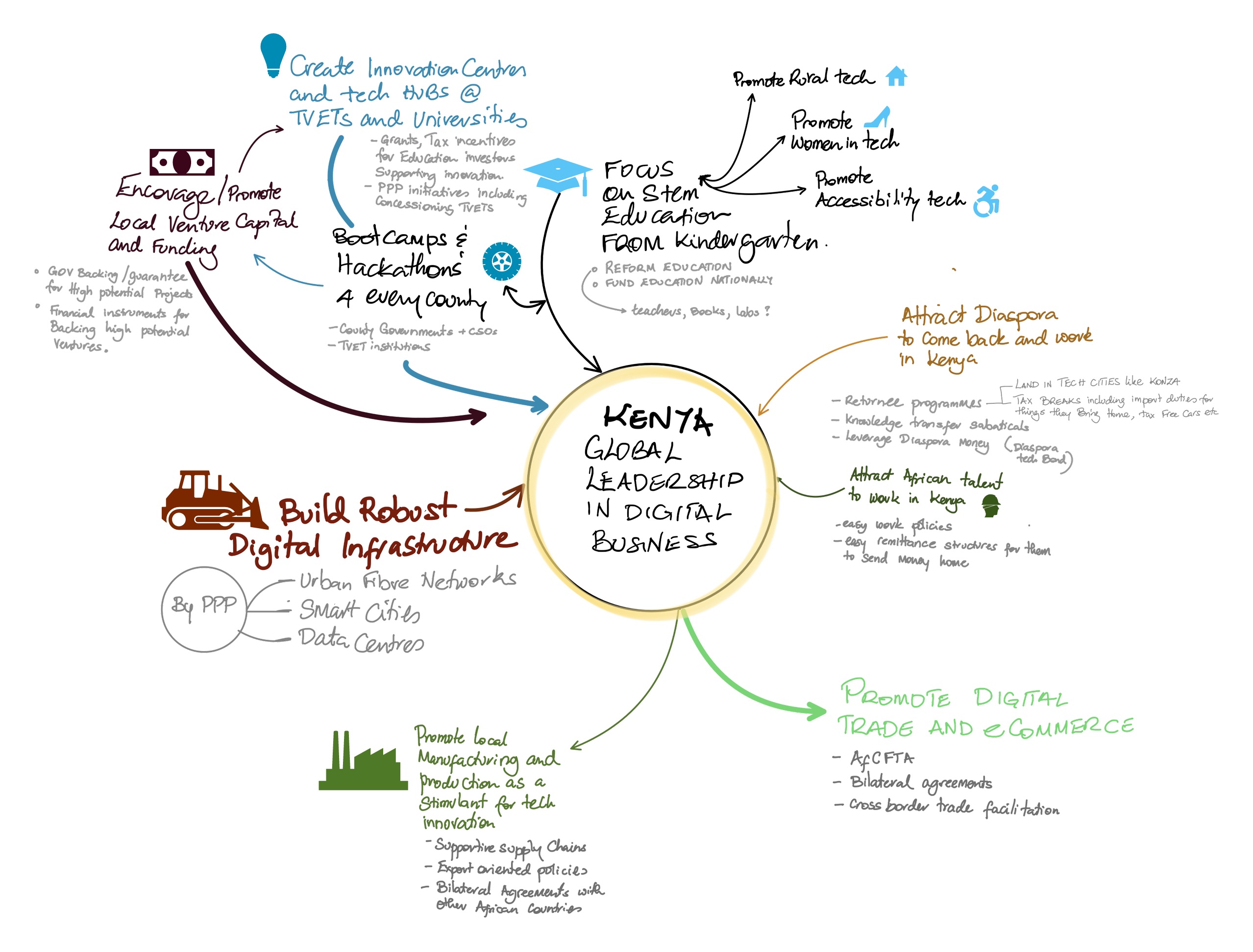I am excited that President William Ruto appointed Philip Thigo as Special Envoy for Technology, the first in Kenya. I have known Philip since around 2011, as he has been in the trenches of developing our ICT industry from when we were trying to build an ecosystem of developers and tech startups to establishing Kenya’s structures for data. Over the past ten or so years, Philip has done a lot of work to position Kenya as a major destination for technology investment – often at his own cost. His passion for Kenya’s tech industry cannot be argued with.
Last week, I blogged that in rewilding the global digital jungle, African governments must be bold and imaginative enough to reposition the continent from net technology users to net producers of products used and sold first to Africans. Africa is a colossal market with a population of 1,490,668,364 as of May 19th 2024 (at least 70% of whom are under 30 – at least one billion potential users!).
Imaginative Government Action

To reposition Africa from a net consumer to a net producer of digital technology, African governments must adopt bold and imaginative strategies that harness the continent’s vast potential and youthful population. This vision requires a multifaceted approach, blending education, infrastructure, investment, and international cooperation to foster a thriving homegrown digital ecosystem. Given Philip’s passion and unique way of bringing people together, I hope that many of the ideas governments could deploy to achieve such a vision are now accessible in Kenya.
Reform education and orient it to tech and industry
A foundational step is prioritizing STEM education from kindergarten, ensuring that the seeds of technological literacy are sown early. This must include a strong focus on promoting women in tech, rural tech initiatives, and accessibility technology for people with disabilities (PWDs). A great example is the Girls to Women Foundation, which has been doing the “rural girls can code” initiative, where they train girls in rural Kilifi how to code. Governments can look to expand such initiatives, creating a broad base of tech-savvy individuals ready to innovate and lead.
Innovation and tech hubs are essential for nurturing local talent and fostering creativity. Establishing these hubs within Technical and Vocational Education and Training (TVET) institutions and universities and offering grants and tax incentives to educational investors can stimulate significant investment in tech education. For example, Kenya’s Konza Technopolis is a promising model envisioned as a hub for innovation and technology. Public-private partnerships (PPPs) can enhance these efforts, leveraging the strengths of both sectors to drive technological advancements.
Additionally, pushing for boot camps and hackathons at the subnational level in every county can foster a culture of innovation and practical skill development. Such initiatives can mirror the success of Andela, a company that has trained thousands of software developers across Africa, proving that intensive, hands-on training can rapidly build tech capacity.
Organise the finances and HR for high-potential innovations.
Encouraging and promoting local venture capital and funding is critical for sustaining a vibrant tech ecosystem. Governments should provide backing and guarantees for local venture capitalists who invest in high-potential ICT projects. Financial instruments such as tech bonds and nascent IPOs can support tech investments, creating a more robust financial ecosystem for startups. Rwanda’s Innovation Fund, which supports tech startups, is an example of how targeted financial support can spur innovation and growth in the tech sector.
Attracting tech professionals from the diaspora back to Africa can significantly boost the local tech industry. Offering attractive returnee programs, such as homes or shares in smart cities, tax breaks, duty-free car purchases, and diaspora-specific bonds, can incentivize skilled individuals to return home. The success of China’s “Thousand Talents Plan,” which attracted top Chinese talent back to the country with similar incentives, illustrates the potential impact of such programs.
Building robust, global-quality digital infrastructure is essential for supporting a thriving tech ecosystem. Investments in data centres, smart cities, and urban fibre networks through concessions and PPPs can create the backbone needed for advanced digital operations. These initiatives like the MDXi data centre in Nigeria, operated by MainOne, were developed with substantial support from the Lagos State Government. This collaboration has resulted in critical ICT infrastructure that bolsters Nigeria’s tech ecosystem. The data centre facilitates local and international business operations by offering colocation, cloud, and interconnection services.
Drive trade & manufacturing.
Promoting digital trade and e-commerce opportunities within Africa can help Kenyan products reach a broader market. Leveraging the African Continental Free Trade Area (AfCFTA) and fostering bilateral agreements can open up new opportunities for Kenyan businesses. Aggressively marketing Kenyan products in other African countries can boost local industries and create new economic opportunities. For example, Jumia, Africa’s largest e-commerce platform, has successfully expanded across several countries, highlighting the potential for regional digital trade.
Finally, promoting manufacturing and production can stimulate innovation, particularly in cottage industries. Creating tax incentives for manufacturing investment, zero-rating manufacturing equipment, and promoting products made in Kenya across Africa can foster a more vibrant local industry. Ethiopia’s industrial parks, which offer manufacturers tax incentives and infrastructure support, demonstrate how such measures can attract investment and boost local production.
Philip’s edge
By adopting these aggressive, visionary measures, African governments can transform the continent into a vibrant, self-sustaining digital ecosystem. Philip’s appointment signals a strategic shift in Kenya. This shift will enhance our global competitiveness in emerging technologies and drive sustainable economic growth and development. I believe it will make Kenya a leader in the digital age.
I have great hope.